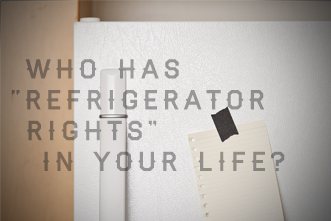Who has refrigerator rights in your life? Refrigerator rights can tell us a lot about our relational health. It’s not just about the food in your fridge, is it? It’s about more than that.
Sociologically, belonging is complex. We have different relational and sociological needs that a one-size-fits-all gathering can’t meet. Jesus operated in these four social spaces as well:
- Public Space (large gatherings like the Sermon on the Mount)
- Social Space (20-70 people — the 70 — a network)
- Personal Space (Family space — life group — the 12 disciples)
- Intimate Space (1-3 people who know everything — running partners — Peter, James and John)
A British think tank put together the Happy Planet Index, which combines life satisfaction, life expectancy and the resources required. The United States came in almost last — 150 out of 172 countries. The #1 happiest country was Vanuatu, population 200,000. The spokesperson for the study said, “People are generally happy here because they are very satisfied with very little. This is not a consumer-driven society. Life here is about community and family and goodwill to other people.”
The country is quite diverse with over 150 different languages spoken. 83 percent of Vanuatu are Christ-followers following the relational way of Jesus.
Maybe the American myth of independence is not getting us what we really want. We were created for community — with God and others.
People were never intended to live independent of God or one another. Since we were created for community, why do we try so hard to live independent and on our own pretending we don’t need anyone? Sniff — it’s because of that SMELL. We all have at least a few Tupperware dishes of old, nasty-smelling food in our fridge. That smell is like the pain festering from relational wounds or the shame over things done to us or things we’ve done. We’d rather not deal with it or let others see it. We’ve all been wounded by community gone astray.
Genesis reveals that once people turned away from God and His will, it separated us from God and each other. The first impact of separation from God is alienation from self.
They sewed fig leaves together and made coverings for themselves. Then the man and his wife heard the sound of the LORD God as he was walking in the garden in the cool of the day, and they hid from the LORD God … ” — Genesis 3:7-8
They felt shame and become self-conscious — no longer One with God or each other. They ran and hid from God trying to pretend nothing happened.
Once confronted, Adam shifted to blame.
[God] said, “Have you eaten from the tree that I commanded you not to eat from?” The man said, “The woman you put here with me … ” — Genesis 3:11-12
We run and hide from God, then keep doing things against His will, trying to feel secure, loved, important. We hurt each other, then we deny, we blame and shame and isolate ourselves to avoid more hurt. This is the story of the human race.
When we blame others rather than take personal responsibility, we are robbing ourselves of the opportunity to make the changes we have the power to make! We don’t have to be victims. We have the power to choose our own path forward.
What if God wanted to change the rules?
God’s new set of rules are designed to wipe out the effects of our turning away from God. What if we as a community decided to live according to God’s new way? Amazing things would happen! Here are the new ways we should live our lives:
- Rule #1 – There’s no condemnation from me.
- Rule #2 – No more hiding and pretending.
- Rule #3 – Walk together with God and one another to grow; together we can all grow up to be more of what God intended.
If we made this shift from the world’s ways to God’s ways, we’d experience a love, a security, a peace and a strength and growth like we’ve never known before.












